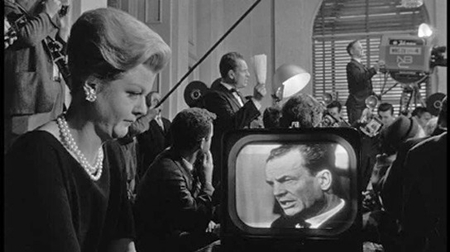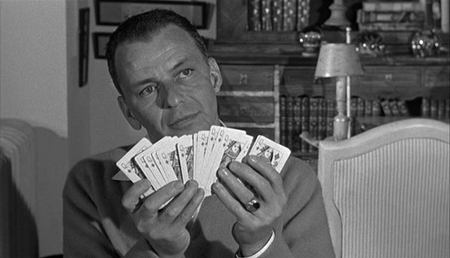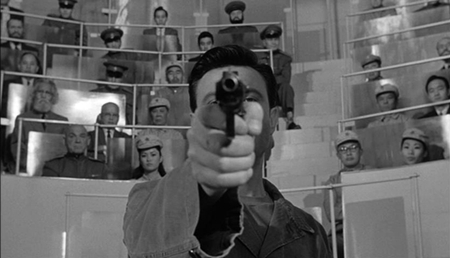By Film Noir Blonde and Mike Wilmington
The Noir File is FNB’s guide to classic film noir, neo-noir and pre-noir from the schedule of Turner Classic Movies (TCM), which broadcasts them uncut and uninterrupted. The times are Eastern Standard and (Pacific Standard).
PICK OF THE WEEK
“The Manchurian Candidate” (1962, John Frankenheimer). Thursday, July 18: 9:45 p.m. (6:45 p.m.)
In John Frankenheimer’s classic 1962 movie thriller “The Manchurian Candidate,” we will be plunged into one of the greatest nightmare sequences in American cinema.
After the “Korea, 1952” opening title, we see a squad of U. S. Army soldiers, led by their good-guy Major Bennett Marco (Frank Sinatra) and brusque Sgt. Raymond Shaw (Laurence Harvey). They go out on a mission but are betrayed by turncoat guide Chunjin (Henry Silva), then handed over to Russian officers and helicoptered off. It’s a bit like a Sam Fuller scene.
Next, we see a U. S. Air Force plane landing at a Washington airport, and a bustle of reporters and photographers swarming over it. A portentous narrator informs us that Sgt. Shaw has won the Congressional Medal of Honor for action in Korea.
We also see that Raymond has an imperious mother, Eleanor Shaw Iselin (Angela Lansbury), and a knuckleheaded sap of a stepfather, John Yerkes Iselin (James Gregory), who also happens to be a U.S. senator and a well-financed presidential candidate – and that Raymond hates them both.
Now comes the nightmare. We are in Major Marco’s hotel room, and we see him tossing and sweating. Why the cold sweat? He’s remembering/dreaming, noir-style, both the days of the Korean War and one of the strangest club meetings ever seen. It’s a scene that probably only John Frankenheimer could have executed and shot.

Angela Lansbury as Raymond’s malevolent mother is one of many superb performances in this classic film.
The soldiers we met – some now shaggy and unshaven – are sitting on stage at a gathering of a New Jersey women’s horticultural society in a hotel lobby full of plants and flowers. The chairlady and speaker, a know-it-all named Mrs. Henry Whittaker (Helen Kleeb), is delivering a stupefyingly boring lecture on hydrangeas.
Suddenly the setting changes to an ominous bare stage in a medical theater; the walls are decorated with posters of Stalin and Mao. The speaker is a smiling Chinese doctor named Yen Lo (Khigh Dhiegh), who is delivering a lecture on brainwashing the enemy to an audience of Chinese, Russian and probably Korean military and political people. We are in Manchuria.
The scene shifts from the New Jersey hotel lobby to the Manchurian theater and back again. That revolving camera track before the scene splits into eerie, jarring fragments is still an all-time stylistic movie coup.

Frank Sinatra shines as Bennett Marco, a tormented good guy who reads, plays cards and courts love interest Eugenie Rose Chaney (Janet Leigh).
As for the plot, “war hero” Raymond has been programmed by the Red Chinese to be the triggerman in a scheme to destabilize the American government by putting an idiot into the U.S. presidency. The candidate: Raymond’s addle-brained Commie-hunting stepfather.
Frankenheimer lent his terrific neo-noir vision to a fantastic cast: Janet Leigh as Eugenie Rose Chaney, an obligatory love interest, Laurence Harvey in the finest hour of a peculiar career, Henry Silva as one of the main traitors of a movie saturated with treachery and James Gregory a hoot as the reactionary U.S. Senator who can’t keep track of the number of Communists he’s exposing (he finally settles on the easy-to-remember Heinz Ketchup figure of 57). And, as one of the most evil mothers in the history of movies, giving one of the most darkly magnificent performances, Angela Lansbury, long may she reign.
All this is at the service of one of the most hypnotic, blood-chilling yarns ever to be put, mostly uncompromised, on screen: a movie whose twists and turns are brilliantly calculated, largely unexpected and beautifully anxiety-inducing. Few films reflect the Kennedy era, and all its contradictions so memorably and so well.
Frankenheimer was the key. In the 1950s he’d become famous as the enfant terrible of a great generation of TV drama directors – a generation that included Arthur Penn, Robert Mulligan, Franklin Schaffner, Sam Peckinpah, Robert Altman and Sidney Lumet. Frankenheimer was the leader of that group: an instinctive master of live performance and especially, of camera movement.
An ace at left wing social and psychological drama, he went on to make “All Fall Down,” “The Young Savages,” “Birdman of Alcatraz,” “Seven Days in May,” “The Train,” “Seconds,” “Grand Prix” and “The Fixer.” But “The Manchurian Candidate” was the project where he was able to work his virtuosity into the very texture of the film itself, where TV and the way it records real life becomes part of the drama, in this case, a hybrid of theatre and politics.
With “The Manchurian Candidate,” Frankenheimer created a style that was almost as original and exciting and unique as the young Orson Welles,’ and he remained one of the great American moviemakers throughout most of the ’60s.
Friday, July 19
2:30 a.m. (11:30 p.m.): “The Woman Next Door” (1981, Francois Truffaut). In François Truffaut’s intense blend of romantic drama and suspense, Gerard Depardieu and Fanny Ardant (both excellent) play ex-lovers, each remarried, who are plunged into old love and new trauma, when they become next door neighbors. Prime Truffaut: with lucid storytelling; powerful performances. (In French, with subtitles.)
Saturday, July 20
8 p.m. (5 p.m.): “Gaslight” (1944, George Cukor). With Ingrid Bergman, Charles Boyer, Joseph Cotten and Angela Lansbury. Reviewed on FNB Aug. 25, 2012











From FNB readers